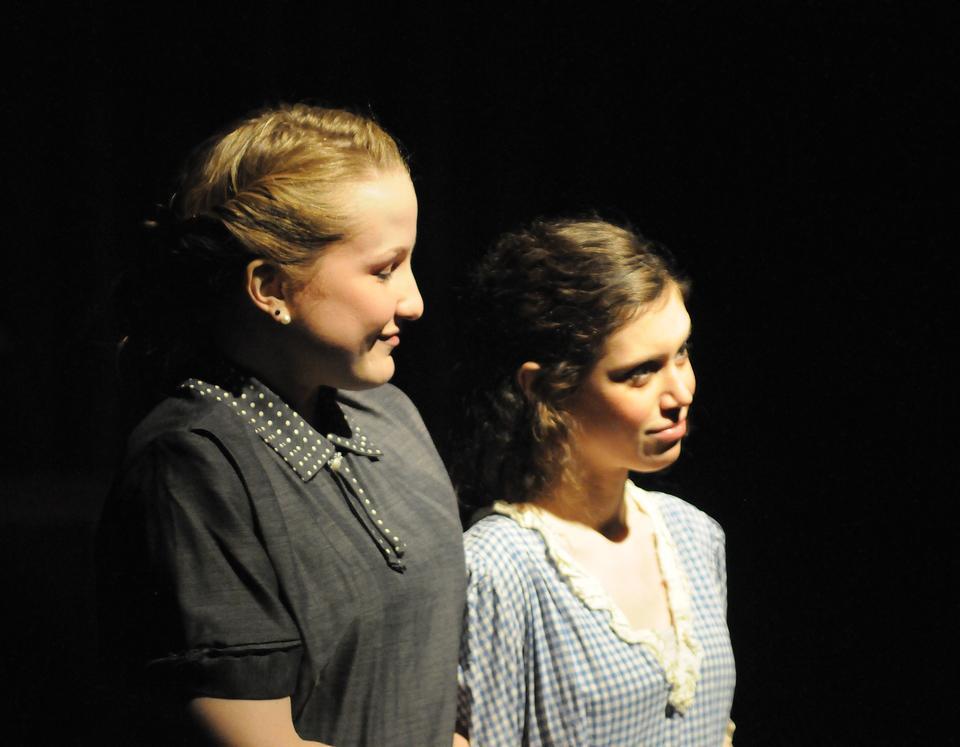
News
Pro-Palestine Encampment Represents First Major Test for Harvard President Alan Garber

News
Israeli PM Benjamin Netanyahu Condemns Antisemitism at U.S. Colleges Amid Encampment at Harvard

News
‘A Joke’: Nikole Hannah-Jones Says Harvard Should Spend More on Legacy of Slavery Initiative

News
Massachusetts ACLU Demands Harvard Reinstate PSC in Letter

News
LIVE UPDATES: Pro-Palestine Protesters Begin Encampment in Harvard Yard
‘Menagerie’ Shines Despite Added Sap

Shifting shadows welcome the viewer to “The Glass Menagerie,” Tennessee Williams’ 1944 play about family and failure. Hung from the ceiling of the Loeb Experimental Theater, sewn plastic figures glisten against thick sheets of cloth. As the audience enters, the wonderful and mysterious sculpture—designed by Sara J. Stern ’12—sways and sighs. It looms over the neat and trim set and veils it with a hesitating shade.
Such shadows are the perfect introduction to Williams’ play, where the hopes of a St. Louis family shatter under a soft mist of melancholy. Their hazy promise is mostly carried through in this production, directed by Megan E. O’Keefe ’11. O’Keefe’s “Menagerie,” which runs through Feb. 27th, is well acted and well thought-out. If the show occasionally stumbles into melodrama, it is only because O’Keefe tries too hard to clarify details that could instead remain a little foggy.
Living in humid, jazzy 1930s St. Louis, the Wingfield family spends much of their time wishing they were elsewhere. Amanda (Caroline R. Giuliani ’11) constantly relives her past as a Southern Belle besotted by male attention. She wants the same youth for her 23 year-old daughter, Laura. But Laura (the wide-eyed Rachel A. Stark ’11—a Crimson news editor), who is slightly disabled and cripplingly shy, instead devotes her days to her collection of glass animals. In and out clamors Tom (David J. Smolinsky ’11), Laura’s exuberant and adventurous younger brother, who dreams of a life more exciting than his job at a shoe factory can offer.
The family’s only beacon lies in an ever-elusive gentleman caller, Jim O’Connor (the pleasant and jocular Anthony J. Sterle ’11), whose presence, they hope, will cure their ills.
This tight plot is really an illustration of weightier emotions. “I have a poet’s weakness for symbols,” says Tom, who often acts as the play’s narrator. As they despair and shout across master painter Snoweria Zhang ’12’s well-crafted backdrop, Williams’s characters are really grappling with the tragedy of their own lives.
Layers of despair call for both depth and nuance, and luckily the production is graced with a skilled cast. Smolinsky, in particular, moves from rowdy son to introspective poet with invigorating ease. His monologues come across both poignant and casual; he is the production’s most likeable character inhabited by the show’s most capable actor.
Giuliani, too, does a fine job of capturing Amanda’s fading beauty, though her fast talk makes her lines sometimes difficult to follow. When she intentionally slips into a Southern drawl halfway through the play, her performance improves greatly.
Much of the production rests on making the audience a part of the crumbling Wingfield household, and O’Keefe craftily invites the viewer in. The seats are pulled in several feet from the wall, so that the Ex, already a small and snug performance space, here becomes even more intimate. When Jim and Laura share a charming dance toward the end of the play, the close setting makes the ethereal moment all the more fleeting.
But at times, such efforts at intimacy tend toward the pedantic. Midway through the play’s intermission, Stark emerges from backstage and begins to toy with the hanging sculpture. Her inviting looks and teasing air seem to beckon viewers to play along. Some audience members joined in, but the rest of the room froze. It’s one thing to slip into Laura’s world, another to be dragged.
Occasional stylistic choices, like a saccharine soundtrack mostly culled from the 2001 French film “Amélie,” also slightly encumber the production. Stark’s character is already painted as sweet, which she plays to full effect, so the added cuteness comes across heavy-handed.
Williams called “The Glass Menagerie” a “memory play,” which suggests that the piece should run more on its atmosphere than concrete facts. Williams himself has a poet’s weakness for symbols, and the play needs a certain fragility to keep it from being overly melodramatic. The current production in the Loeb sets the right mood and proceeds with confidence. When it plods, it also does so with charm.
—Staff writer Madeleine M. Schwartz can be reached at mschwart@fas.harvard.edu.
Want to keep up with breaking news? Subscribe to our email newsletter.
